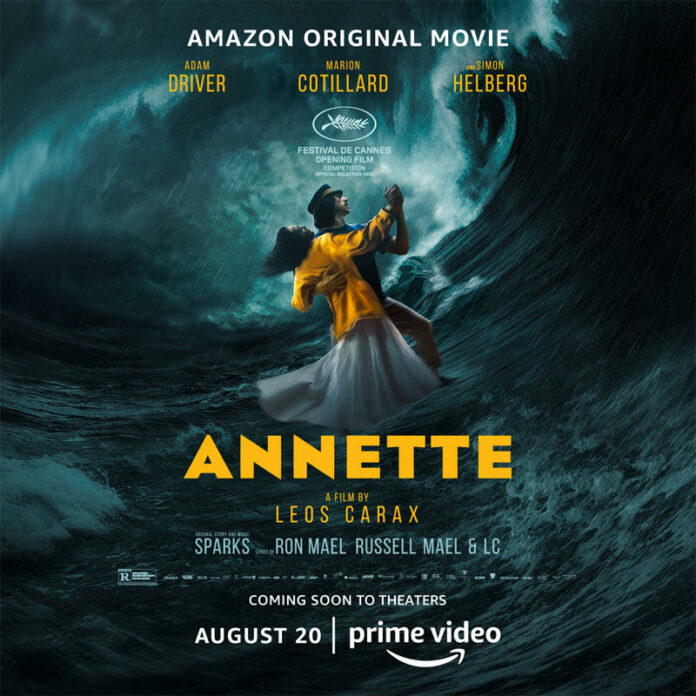The surreal rock opera falls short with awkward artistic choices and an unsuccessful social commentary
By ANGIE CUMMINGS — arts@theaggie.org
“Annette” was perhaps one of the most talked-about movies of the Cannes Film Festival this year, due in part to its star-studded cast and its eccentric combination of operatics and surreal storytelling.
The film is now available for free on Amazon Prime, meaning anyone is able to watch Adam Driver, the movie’s lead, yell and attempt to sing for two hours. Essentially, it tells the story of the destructive stand-up comedian Henry (Adam Driver) and his whirlwind romance with a successful opera singer named Ann (Marion Cotillard), who plays the part of the absurdly clichéd lover, wife and ultimately mother.
Not to say that Driver and Cotillard are not exceptionally talented actors, but even with Driver’s quintessential aggression and Cotillard’s beautiful voice and gentleness as an actress, the movie has multiple segments that seem to go on for years. Yet, nothing is said or done — not to mention, they are upstaged by a (slightly unnerving) wooden puppet.
This brings us to “BABY ANNETTE!” — this is how her name is said about 50 times throughout the movie. Henry and Ann’s only child ends up being a cognizant, singing doll/puppet who Henry soon begins to exploit for her talents as his own success as a comedian quickly dwindles after his child’s birth and later loss of his beloved Ann. The wooden doll is one of many surreal aspects of this musical drama, but interestingly enough, it is not what makes the film too conceptual to truly enjoy.
The real problems I and so many others on Rotten Tomatoes have with the film come from the music, the casting and the poorly executed social commentary this film was trying to make. This is not to say that it is not watchable, but one moment you might find yourself reaching for your phone during a scene that is ten lines too long, and then a moment later you’ll be lost in the storm of “Annette.” Even with some redeemable moments, by the end of the film, you will be wondering what the point of those two hours was.
The 15 songs of this movie’s soundtrack are “woven” into the script — the songs themselves are primarily a hybrid form of talk-singing, so a song might be starting and your only clue is the fact that a line is being repeated or that there are too many rhymes to be a coincidence. The one musical number that feels completely appropriate to this conceptual film is the opening “May We Please Start” because it successfully establishes the film as a theatrical performance, and alerts viewers to the dramatic nature of the entire movie. I cannot say as much for the rest of the songs, which just directly sing out the characters’ thoughts and motives.
Driver is a powerful and talented actor and obviously has an affinity for yelling in his roles, but was he the right choice to play what is supposed to be a charismatic, controversial comedian in a singing-heavy role? No, he was not. I thoroughly believe Driver was simply the wrong choice for this character, who is eerily similar to the now-disgraced comedian Chris D’Elia, who had the same kind of purposely offensive stand-up act as Henry in this film.
Not only is no part of Henry’s act actually funny, but it gets to be quite tiresome when he continually screams at the audience “Laugh, Laugh, Laugh, Laugh!” as if doing some sort of Joker cosplay on stage. Additionally, it is almost impossible to see a hulking Driver as anything other than a threat to Cotillard’s petite, damsel-in-distress character. Their juxtaposing figures and characters removed any ounce of suspense as to what is to come for Ann, but perhaps it was done on purpose (although just because something is done on purpose does not mean it is a good decision).
On the other hand, Cotillard is beautiful and perfect in the role, with her riveting voice and innocent look that evokes feelings of hatred toward Henry for hurting her. And yet the role is almost too small for an actress of her prowess — it is almost astonishing how little Ann actually speaks throughout the entire film. When she does open her mouth, it is most often to sing, and Cotillard’s voice does repair the damage done to the audience’s ears after each time Driver does his form of yell-singing.
Again, it could have easily been a conscious choice to silence the female lead of this film, as a far too blatant metaphor for how successful women are “silenced” by the men around them. The question must be asked, did anyone need this metaphor to learn the dangers of misogyny? And did we need a film where a bunch of men overpower and take control of the few women in each scene (primarily just Ann and baby Annette), even if it was supposed to be a satire?
In an attempt to present a misogynist getting what’s coming for him after his crimes against a caring woman who surpasses him in her career, we are instead forced to sit through two hours of a self-serving, destructive man “singing” and killing people. Perhaps the “#feminist” love scenes that were included (quite abruptly) were supposed to repair the oversight of women in the film, but in reality, having to watch Driver sing “We Love Each Other So Much” into Cotillard’s thighs was more of an annoyance than anything else.
The surreal aspects of this film would have worked so much better if the creators simply did not attempt to force a feminist commentary where it did not belong — a film does not have to make some grand statement about society, especially coming from an all-male production team.
Written by: Angie Cummings — arts@theaggie.org





